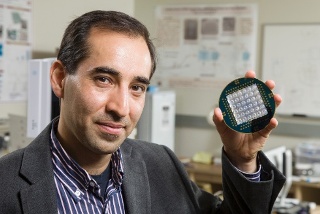Apr 16 2015
Masoud Agah, Virginia Tech's Bradley Department of Electrical and Computer Engineering associate professor has designed a credit-card-sized gas chromatography platform that is capable of analyzing volatile compounds in a few seconds.
He received the National Science Foundation award to conduct this research and has been involved in the development of micro gas chromatography systems for the past few years.
 Masoud Agah, of Virginia Tech’s Department of Electrical and Computer Engineering, is holding up a microelectrode array, used for real time electrical recording of cellular activity.
Masoud Agah, of Virginia Tech’s Department of Electrical and Computer Engineering, is holding up a microelectrode array, used for real time electrical recording of cellular activity.
The development of micro fabrication technology over the last few decades has dramatically transformed various sectors including automotive manufacturing, signal processing and computing. Gas chromatography is an instrument used for industrial, medical, and scientific applications to analyze harmful, volatile organic compounds present in solids, liquids and gases.
"The advantages that such miniaturized instruments can provide include the portability for analysis in remote locations with high throughput and low cost," Agah said. A war zone might be considered a remote location.
Agah identified the reason behind the research during his experiment. He further explained the acceptance of "the hybrid integrated approach" in the research community for the development of micro gas chromatography system. He stated that this method is "less vibrant in the monolithic integrated approach."
The hybrid integration approach enables miniaturization of the key components of the system on individually fabricated chips. The components are then arranged with the help of off-chip fluidic interconnects that are commercially available.
"This hybrid integration method leads to an increase in the fabrication cost since it involves the separate processing of the individual components," Agah added.
The manual assembly of the individual components is really a cumbersome job and increases the overall weight and footprint of the micro gas chromatography system.
To some extent; the hybrid integrated approach is inconsistent with the purpose of micro gas chromatography research since further improvement in terms of size, cost, and performance can be achieved by the single chip or monolithic integration of micro gas chromatography components.
Masoud Agah
Associate Professor at Virginia Tech
Agah along with his graduate students Hamza Shakeel of Rawalpindi, Pakistan and Muhammad Akbar of Islamabad, Pakistan, has developed a unique gas chromatography on-chip module. His recent work on this area is published in an article of the journal of the Royal Society of Chemistry called Lab on a Chip.
"The experimental results are really encouraging and address the deficiencies I described. The gas chromatography on-a-chip provides highly efficient separations and detection, reduced analysis times using temperature and flow programming, as well as fast detection response times suitable for high-speed gas chromatography," Agah revealed.
The reliability of the system was also found to be satisfactory. Furthermore, the findings proved to be highly repeatable with far less variations and no damage to the detector excitation electrodes following continuous operation for 10h.
The National Institute for Occupational Safety and Health and National Science Foundation (NSF) supported the research under award numbers 1R21OH010330 and ECCS-1002279.